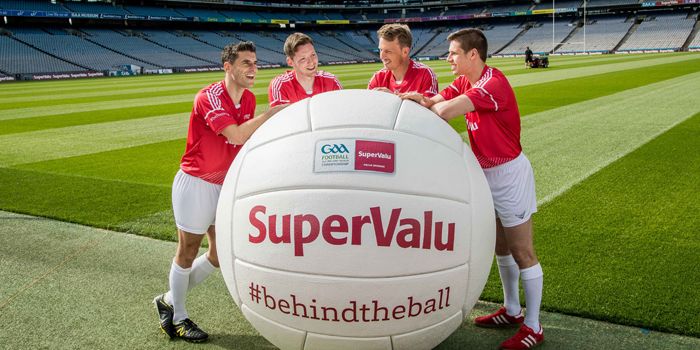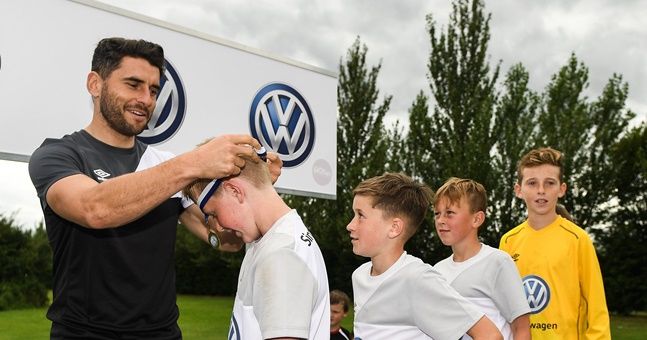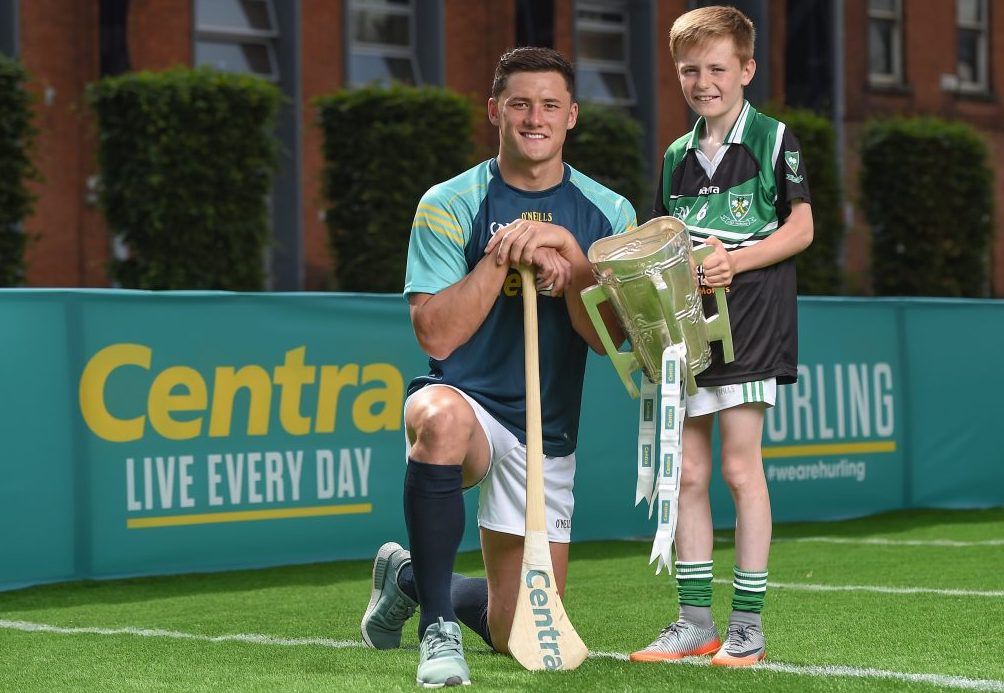

Share
22nd January 2018
09:14pm GMT

 The GAA has championed its amateur status for decades, but when you walk down Jones' Road and you pass a massive Bernard Brogan 'King of the Hill' billboard, to then see that person wearing a Super Valu jersey inside the stadium's corporate suite a few minutes later, it takes a lot of the gloss off the whole 'could be a Gard, could be a teacher' mantra.
For Bernard Brogan is a brand as much as he is a Dublin footballer. He is King Crisps' King of the Hill. He's Super Valu's Leinster brand ambassador. He picks up actors in a Volkswagen Tiguan and takes them for a spin around the capital, filmed, of course.
In a piece in the Irish Independent's Indo Review in 2015, a sports agent who worked with the 2010 Footballer of the Year said that he could command a salary of €100,000 through sponsorship alone.
The GAA has championed its amateur status for decades, but when you walk down Jones' Road and you pass a massive Bernard Brogan 'King of the Hill' billboard, to then see that person wearing a Super Valu jersey inside the stadium's corporate suite a few minutes later, it takes a lot of the gloss off the whole 'could be a Gard, could be a teacher' mantra.
For Bernard Brogan is a brand as much as he is a Dublin footballer. He is King Crisps' King of the Hill. He's Super Valu's Leinster brand ambassador. He picks up actors in a Volkswagen Tiguan and takes them for a spin around the capital, filmed, of course.
In a piece in the Irish Independent's Indo Review in 2015, a sports agent who worked with the 2010 Footballer of the Year said that he could command a salary of €100,000 through sponsorship alone.
"I don't think it's outside the bounds of possibility that he might make €100,000 in sponsorship in a good year," said the agent. "When you compare that sort of money to what the rugby guys can command, for instance, it pales, but it's impressive when you consider that he plays an amateur sport that has resisted pay-for-play for years."
 "He's got it all," said Eoin Conroy of Titan Marketing.
"He's very well known nationwide, not just in GAA circles, he's highly articulate and very presentable and he's got a strong social media presence."
Brogan is a brand ambassador to multiple brands, and if sources are to be believed, he could make a very comfortable living by just being Bernard Brogan, the five-time Dublin All-Ireland winner.
But Brogan is not just a brand ambassador. He's the co-founder of Pep Talk, a workplace wellbeing technology company.
He was a member on the board of directors of Advanced Metadata. He was a director of Legacy Sports and Entertainment Consultants, a specialist professional consultancy firm providing talent representation, sponsorship consultancy and event management services to clients in the sports and entertainment industries.
He was a tax accountant at RSM Farrell Grant Sparks. He has a higher diploma in Accountancy, Accounting and Business/Management from Dublin City University.
Bernard Brogan is not a professional athlete, but rather an athlete with a professional career.
Wexford hurler, Lee Chin, however, could be a professional brand ambassador, i.e. Lee Chin is paid to offer the views, image and endorsement of Lee Chin.
There are opportunities to do it. There are people who will pay to have the best GAA athletes in Ireland associated with their brands.
For example, at an eir Sport launch of its live coverage of the forthcoming Allianz Leagues which will see 17 games broadcast across seven weekends, eir sport, the home of Saturday night Allianz Leagues action, will feature 17 different counties over the course of its coverage, Lee Chin said that he is happy not to be working.
"He's got it all," said Eoin Conroy of Titan Marketing.
"He's very well known nationwide, not just in GAA circles, he's highly articulate and very presentable and he's got a strong social media presence."
Brogan is a brand ambassador to multiple brands, and if sources are to be believed, he could make a very comfortable living by just being Bernard Brogan, the five-time Dublin All-Ireland winner.
But Brogan is not just a brand ambassador. He's the co-founder of Pep Talk, a workplace wellbeing technology company.
He was a member on the board of directors of Advanced Metadata. He was a director of Legacy Sports and Entertainment Consultants, a specialist professional consultancy firm providing talent representation, sponsorship consultancy and event management services to clients in the sports and entertainment industries.
He was a tax accountant at RSM Farrell Grant Sparks. He has a higher diploma in Accountancy, Accounting and Business/Management from Dublin City University.
Bernard Brogan is not a professional athlete, but rather an athlete with a professional career.
Wexford hurler, Lee Chin, however, could be a professional brand ambassador, i.e. Lee Chin is paid to offer the views, image and endorsement of Lee Chin.
There are opportunities to do it. There are people who will pay to have the best GAA athletes in Ireland associated with their brands.
For example, at an eir Sport launch of its live coverage of the forthcoming Allianz Leagues which will see 17 games broadcast across seven weekends, eir sport, the home of Saturday night Allianz Leagues action, will feature 17 different counties over the course of its coverage, Lee Chin said that he is happy not to be working.
"Well, at the moment I'm at home, I'm not working. I'm happy to be doing what I'm doing at the moment, trying to live as much as a professional lifestyle as I possibly can. I'm enjoying it. "I like having my own time and flexibility to work on whatever I want to work on and do whatever I want to do. For me, it's nice to be able to do something like that but I can imagine it's very, very tough for other guys who do have work commitments and especially guys that are on the Wexford panel that live in Dublin and have to do a lot of commuting too. "A lot of guys are happy with what they're doing with their lives in terms of profession and work. It's the road that they went down and it's what they want to do, it's what they want to achieve in their lives other than what they achieve on the field or in sport. A lot of guys are living their dreams in terms of their jobs. "I wouldn't call myself a professional sportsman, but I try to live as close to that lifestyle as possible."
 Chin might not consider himself a professional sportsman, but, then, what is he? He has admitted that he has no job. He dabbled with college, twice, and hairdressing in the past, but is now content with immersing himself fully in hurling.
He's a 25-year-old, who is a qualified barber, who says that his family facilitate his lifestyle.
Chin might not consider himself a professional sportsman, but, then, what is he? He has admitted that he has no job. He dabbled with college, twice, and hairdressing in the past, but is now content with immersing himself fully in hurling.
He's a 25-year-old, who is a qualified barber, who says that his family facilitate his lifestyle.
"My mother at home is very good. She always makes me lovely dinners whenever I want them. "It's a choice, it's not really about what allows you to do it, it's a choice if you want to do it and make it work within it. "At the moment, I'm very happy in terms of what I'm doing. I don't really want it to change too soon but I know, in the future, obviously, things will change but for the moment I'm happy with where I'm at."His family may facilitate him, but he can still earn money himself through various ventures with Fulfil Nutrition, CARPE OMNIA clothing, eir Sport, AIB and their #TheToughest series, Fitness Food HQ, iPro Sport, Mibodi, Benetti, Centra, John West, Mazda, RTE and Ireland's Fittest Family, Little Dragon Supplements, instantspeedtraining. https://www.instagram.com/p/BeJAeT3jkTd/?taken-by=leechin8 https://www.instagram.com/p/BdK7MjOj3Em/?taken-by=leechin8 https://www.instagram.com/p/BY8aBHaD6-c/?taken-by=leechin8 Lee Chin may not have a job but he has a profile, he has a glowing reputation where people all over Ireland look up to him and he has 28.4k followers on Instagram and 7.8k followers on Twitter. That's a revenue stream. If Brogan can reportedly earn in excess of €100,000 as the GAA's most marketable player, what can Chin garner with his fleet of sponsors? Lee Chin may not receive direct income from Wexford GAA, but he has leveraged his profile as a Wexford hurler to live the life of a professional athlete. Is that not a professional athlete? A player essentially paid to play sport? Cork Camogie player Ashling Thompson could live a similar life as a Red Bull brand ambassador. Professional athletes in an amateur world. But maybe they're not professional athletes. Maybe a brand ambassador is a full-time job and they do have a lot of appearances to make, speeches and interviews to do and miles to rack up, although, the Irish Rugby players fulfill these roles in conjunction with their contracts with the IRFU. They advertise the same sort of products, they show up to the same sort of launches, but they are professional rugby players who engage in commercial opportunities in conjunction with their full-time jobs as professional athletes. The GAA has developed a reputation for decades where intercounty players will be assisted in finding gainful employment, and maybe where Lee Chin would have worked at a bank 10 years ago, attending school visits and meeting and greeting prospective clients, in 2018 he bypasses that entire process with a solid social media following. Even the cushiest of cushy handout jobs is entirely unnecessary for a player of his profile. https://twitter.com/LeeChin8/status/875706320904650754 But is it a problem? Is this a bad example for the GAA? Does the next generation of players look at Chin as the blueprint to success or do they follow Bernard Brogan's example? I have no problem with Chin earning a full-time salary as a brand ambassador. In fact, it's very hypocritical to sell your written work to various companies and then criticise a player for selling his image and his own words to companies. I don't have a problem with Lee Chin and his source of income. I live in a generation of YouTube millionaires and Instagram models. But I do worry about professional athletes who leave their sport with no qualifications and no job prospects in their mid-thirties. Players who are unable to transition into the workforce as they are unable to find a way of translating their elite skill of sticking a ball into the back of the net into a full-time job. Players who enter an identify crisis and become depressed because they feel they have no place in a society where their skills are no longer valued. The GAA does not have anywhere near as much of an issue with this problem as other sports, mostly, because their players are professionals who play football and hurling, as opposed to professional footballers and professional hurlers. They go to college, they learn a trade, and when their playing careers are finished, they continue on as professionals in whatever their chosen vocation may be. However, Chin and Thompson may be able to sustain their status as professional brand ambassadors even after their playing careers come to an end. According to one prominent Irish sports agent, Brian O'Driscoll and Paul O'Connell make more money outside of rugby now than they ever did as players. But, of course, the problem is rarely the success story, it's those that fail trying to imitate the success story. The people who become disenfranchised and detached as a result of failing to live the dream laid out by others. Gaelic Football and Hurling are not professional sports but they may have professional players. But again, what is a professional athlete? A player who is paid to play sport or a player who is paid as a result of sport? Is there a difference? Does it matter?
Explore more on these topics: